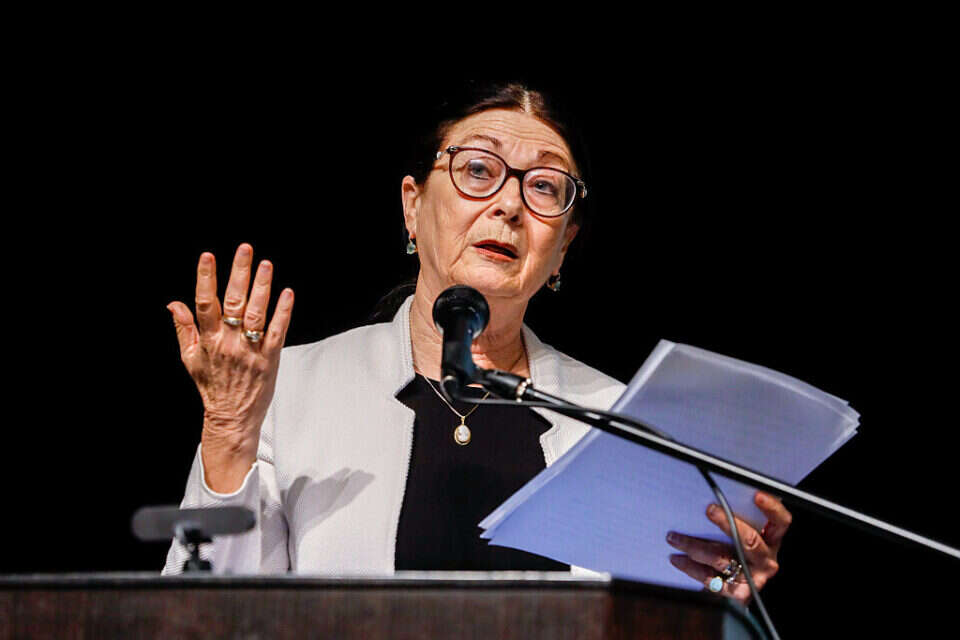The Constitution, Law and Justice Committee of the Knesset will begin marathon discussions this morning to advance the legislation of the Basic Laws, which legislative initiatives all together constitute the so-called "Levin Reform".
If until now the reform was at the level of declarations, now in the Constitutional Committee it descends to the details, to the drafting of the articles of the law.
Before and after the President of the Supreme Court's strong speech on Thursday and the huge demonstration in Tel Aviv last Saturday evening, voices are heard from the coalition that allow an opening for negotiations and compromises to be made.
That the Levin reform will not remain as it is, but will be moderated.
Some?
It is not clear.
And it is not clear whether these are authentic voices or a false representation to appease the spirits.
Supreme Court President Esther Hayut at the Supreme Court, archive, photo: Noam Rivkin Fenton
The problem now lies with the elites.
Hayut's speech was so firm that it left no room for compromise.
Hayut climbed the tree, even at the top some understand that it was too high.
If two sides are fighting a zero-sum game, all that remains is to collect the bodies from the field.
The President of the Supreme Court should say what and how much she is willing to compromise.
The aggressive line earned her applause from her colleagues and neighbors, but if her peace is indeed like the peace of the country, as a language, she must accept compromises as a condition for similar compromises that the politicians will accept.
In the work of "give me and I'll give you", both sides have been practicing since the committee for selecting judges.
The first bill to be discussed by the committee, starting today, deals with the status of the Attorney General vis-à-vis the government.
Seven sections which according to the proposal will be amended to the basic law: the government.
Although there are disputes about this even among the supreme judges, it is common to say that the current law today is that the advisor's opinion is not advice but a binding instruction.
Another consideration for amending the law is that the ombudsman has a monopoly on representing the state in the High Court - so it has already happened sometimes that a minister's decision is attacked in the High Court, the ombudsman joins the petitioners and he is left without representation at all.
The bill seeks to change both of these: the Ombudsman's opinion is a recommendation for the Minister of Freedom to choose who will represent him at the High Court.
Additional and significant: the ombudsman of a government ministry will be appointed as a trusted servant of the minister, similar to the director general of the ministry.
Ombudsman Gali Beharve-Miara opposes this, of course. Just yesterday, Deputy Ombudsman Sharon Afek spoke and said: "In the near future, far-reaching proposals will be discussed, which may change the public legal service. Proposals that mean weakening it beyond recognition. Let's hope and believe that our voice will be heard and will have an effect. This is the order of the hour at this time."
Prime Minister Netanyahu with Supreme Court President Esther Hayut, photo: Oren Ben Hakon
The most dramatic bill is in the basic law: the judiciary.
Dozens of clauses that generate three revolutions: the first, changing the composition of the committee for selecting judges in a way that will give the coalition a majority without the ability of the judges to veto.
In addition, the abolition of the seniority system - the method of selecting the president of the Supreme Court based on seniority, and giving the committee the option to appoint a president from outside the court.
The second, recognition of the High Court's authority to invalidate Knesset laws, but allowing the Knesset to overcome the invalidation of a law - an "overriding clause" by a majority of 61 Knesset members.
The third, the cancellation of the "probability cause" which allows the court to intervene and invalidate decisions of the executive authority, that is, the government, and any of the state institutions.
Administrative law will be waived along with the other grounds for judicial intervention and review, which are lack of authority, the correctness of the procedure and compliance with legal requirements.
were we wrong
We will fix it!
If you found an error in the article, we would appreciate it if you shared it with us

